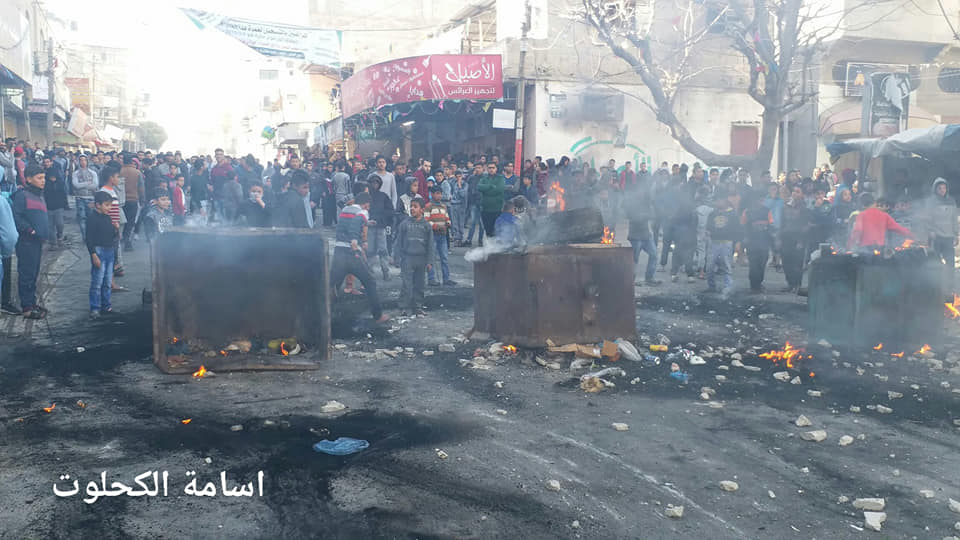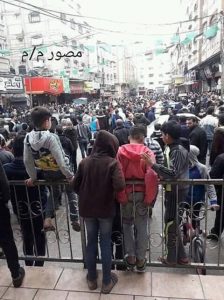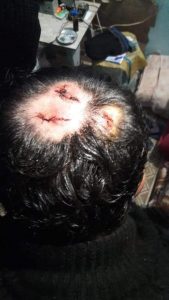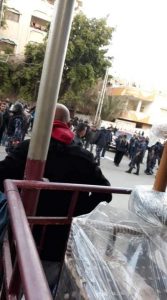FRESH AIR
Australian media failed to report the Gaza unrest which may explain the recent Gaza rocket attacks
March 28, 2019 | AIJAC staff

Consumers of the media in Australia were adequately informed of the events of the last few days in Israel and the Palestinian territories – whereby a large rocket fired from Gaza into central Israel on March 25, injuring seven people, triggered a round of violence. Israeli retaliated with air-raids against Hamas targets in Gaza while some 60 additional rockets were fired into Israel from Gaza. Things began to quiet down yesterday.
However, Australians would not have adequate background for these events because the Australian media has barely covered what has been happening in Gaza over the past two weeks – namely that Hamas is under unprecedented domestic pressure from Gazans over economic welfare issues.
While it is not clear what precipitated the launch of the longer-range rockets on Monday and another attack on March 11, which together triggered the current round of violence, many, especially among Palestinians, are linking the launches to the anti-Hamas protests.
Osama Al-Qawasmi, a spokesperson for the Fatah movement which controls the Palestinian Authority (PA) in the West Bank, wrote in the official PA daily Al-Hayat Al-Jadida on March 16 concerning the earlier missiles launched on March 11: “Launching missiles in order to put down the uprising of the starving is an unacceptable act, and is overt and obvious to all.”
Some Gazans are saying the same thing. For instance, Ibrahim Abu al-Naja, a social worker from Gaza City, told a Jerusalem Post journalist, “A war with Israel will help Hamas divert attention from the growing anger towards its repressive measures … The Hamas leaders are holding our people hostage. Most people here don’t want another war.”
Some serious analysts also see a likely link – for instance, David Makovsky of the Washington Institute for Near East Policy.
Yet Australians are not in a position to know about this possible link because they likely know little or nothing about the actual Gaza protests if they get their information solely from Australian sources.
For instance, the Associated Press story on the rocket violence over the last few days published by the Age and Sydney Morning Herald (March 27) made only the most oblique – not to mention somewhat misleading – reference to the Gaza unrest, saying merely:
“Hamas, meanwhile, is under growing pressure domestically because of its failure to get Israel and Egypt to ease their Gaza border blockade, imposed after the 2007 Hamas takeover.”
The extensive unrest and Hamas oppression has become mere “pressure” and the widespread protests against Hamas’ rule and economic mismanagement have become anger about the blockade in this telling. Moreover, given the lack of reporting, few Australians would even know enough about the situation in Gaza to recognise how grossly incomplete this description is.
Given that the Australian media has not done its job in reporting on the protests in Gaza and the Hamas reaction, here is AIJAC’s attempt to fill the vacuum and provide you with some basic facts on them.
- Starting from mid-March, what seems to be a grassroots civil movement in Gaza, has started to organise and demonstrate against the deteriorating living conditions in the Strip.
 Demonstrations in Jabalia on March 14, 2019 (Bawabat al-Hadaf Twitter account, March 14, 2019)
Demonstrations in Jabalia on March 14, 2019 (Bawabat al-Hadaf Twitter account, March 14, 2019)
- Since March 11, under the slogan “Bidna Naish” (We want to live), Palestinian Gazans, many of them young, have set up meetings across the strip and have taken to the streets to protest the constantly rising costs of living, unemployment and taxes. Without mentioning Hamas by name, the protesters call for “the administration” to enable them to “live with dignity”, in some cases also setting tyres on fire.
- On one occasion (March 16), a Palestinian set himself alight in the Jabaliya refugee camp to demonstrate his frustration over his financial troubles. This may have been an attempt to mimic the famous 2011 event which started the anti-establishment unrest in the Arab world (aka The Arab Spring), when Tunisian Mohamed Bouazizi, burned himself to death.
 A demonstrator injured during the suppression of the demonstrations (Facebook page of journalist Usama al-Kahlut, who was detained by Hamas’ security forces, March 14, 2019).
A demonstrator injured during the suppression of the demonstrations (Facebook page of journalist Usama al-Kahlut, who was detained by Hamas’ security forces, March 14, 2019).
- The Hamas security apparatus has responded with violent repression of the demonstrations which have spread all across Gaza. Protesters were detained and beaten by security officers with clubs, who also shot into the air to disperse the crowd. Tasers were used, houses were destroyed and reporting on the protests was banned. A few dozen Hamas policemen were also injured in the clashes.
- Pictures of the wounded demonstrators have been circulating on social media platforms and receiving wide support. A few schools and commercial centres went on strike in response to the violent suppression of the demonstrations. Palestinian groups from inside and outside Gaza, including the PLO, have expressed support for the protests and condemned the extreme force used in the suppression of the demonstrations.

he Hamas security forces detain Fatah activists in the Gaza Strip (official Fatah Facebook page, March 17, 2019).
- It is alleged gunmen kidnapped and broke the arms and legs of a senior official of the rival Fatah movement in Gaza. Fatah also claimed that Hamas “detained about 1,000 people in just a few days” and “dispersed more than 25 rallies with live fire”, though this has not been independently confirmed.
- Reports from Palestinian sources claim as many as 24 journalists have been arrested by Hamas security forces to prevent them from covering the protests.
- Hamas is blaming the Palestinian Authority (PA) controlled by rival Palestinian movement, Fatah, for both organising the protests and for the economic hardships in Gaza, following the decision of the PA to halt payments to Hamas officials a few months ago. To counter the protest movement, Hamas organised several anti-PA marches.
- The UN has condemned the Hamas treatment of protesters and journalists, with Nickolay Mladenov, the UN envoy for Israeli-Palestinian peace efforts, saying, “I strongly condemn the campaign of arrests and violence used by Hamas security forces against protesters, including women and children… I am particularly alarmed by the brutal beating of journalists and staff from the Independent Commission for Human Rights (ICHR) and the raiding of homes.”
For more information on the unrest, see this report from the Meir Amit Intelligence and Terrorism Information Centre.
Tags: Australia, Gaza, Hamas, Israel, Media/ Academia, Palestinians
RELATED ARTICLES

US Middle East strategy amid regional instability: Dana Stroul at the Sydney Institute

Antisemitism in Australia after the Bondi Massacre: Arsen Ostrovsky at the Sydney Institute





















